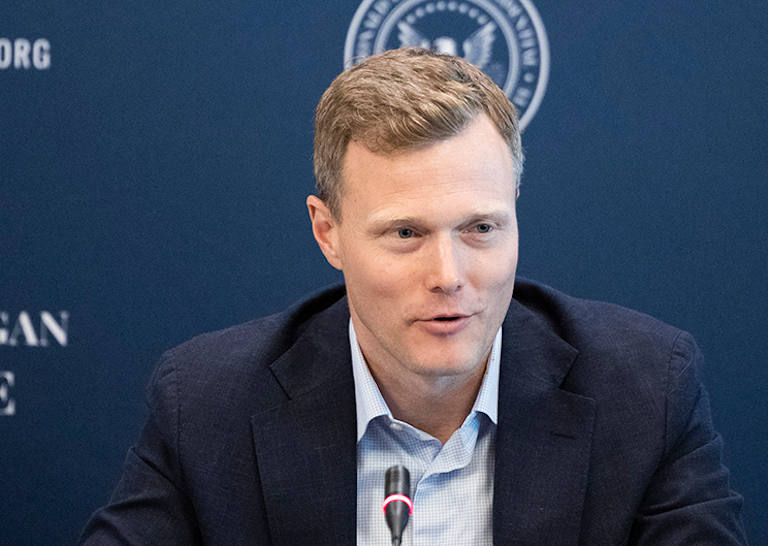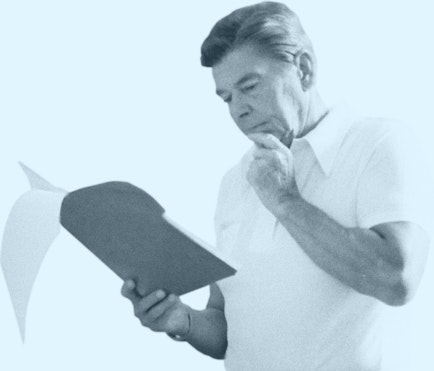Ronald Reagan Institute
NATO’s New Opportunity: U.S. Commitments in Europe after Russia’s War in Ukraine | A Response from Matthew Kroenig
By Matthew Kroenig

A Response from Matthew Kroenig
This brief reflection on Peter Rough’s essay focuses on seizing on the Ukrainian crisis as an opportunity to leverage European allies to advance U.S. global strategy.
The greatest strategic challenge facing the United States is that—for the first time in its history—it faces two, nuclear-armed, near-peer, revisionist dictatorships working together to disrupt and displace U.S. global leadership: China and Russia. The threat from China is most significant. As we have seen in Ukraine, however, Russia is also weak and dangerous. Moreover, these dictators are increasingly working together in a partnership that Xi Jinping and Vladimir Putin proclaim has “no limits.”
The United States may be able to prevail over Russia and China on its own, but it will be much easier with allies and partners. Currently, the United States possesses roughly 23 percent of global gross domestic product (GDP) compared to China and Russia’s combined 19 percent. Adding U.S. formal treaty allies to the equation, however, increases the free world’s share of global power to nearly 60 percent. Working together, the free world still retains a preponderance of power to decisively shape global outcomes.
In recent years, however, European (especially Western European) allies have been unwilling to embrace and contribute their fair share to competition with China and Russia. However, Russia’s aggressive war in Ukraine has been a wakeup call in European capitals with global geopolitical implications.
I spent roughly one month in Europe in May and June of 2022 talking to allied officials in Berlin, Rome, Stockholm, and Copenhagen. All of the officials I spoke with either see Russia’s war against Ukraine as a prelude to the possible threats posed by China or were able to concede the parallels between the cases when pointed out. They understand that a major war (including a possible Chinese invasion of Taiwan) is not an American delusion but something that is indeed possible in the 21st century. They also now feel viscerally the downside risks that come with economic interdependence with aggressive dictators.
There has been a major shift in European thinking and unprecedented Western unity in response to Russian aggression, but we are wasting it on Javelin missiles when we should be leveraging this moment to remake the global order in three ways.
First, Washington should use the crisis to persuade the European Union (EU) to join us in selective decoupling from China. While many European leaders recognized years ago the dangers of dependence on Russian energy, too few were willing to do anything about it. Following Russia’s invasion, however, the West essentially made the decision to decouple from Russia in a matter of days. Washington can use the crisis to make the case that it would be much more effective to carefully and deliberately decouple from China over time rather than wait for an invasion of Taiwan to force another instant decoupling.
The global economy is at an inflection point. The post-Cold War era of globalization is over. We are entering a new era (much more similar to the Cold War) in which economic relationships will be ordered along strategic lines. Washington and Beijing are already decoupling from each other. America’s efforts to reduce vulnerabilities with China, however, will be much more effective if Europe is on board. Washington’s efforts to deny China sensitive technology, for example, will be futile if China can simply acquire similar technology from Europe and Japan. Europe is righty skeptical of a black and white approach to economic decoupling with China, but it can be persuaded of (and in some ways is already moving toward) a selective decoupling.
In a recent report, I propose a three-part framework for selective decoupling. First, in areas of sensitive technologies and other areas of national security concerns (e.g., synthetic biology, artificial intelligence, quantum, 5G, etc.), Washington and its allies need a coordinated and complete decoupling, including export controls, restrictions on inbound and outbound foreign investment, and other measures. Second, in industries where China is engaging in unfair trade practices but there are not national security concerns in play (e.g., the film industry), Washington and its allies should coordinate tariffs and countervailing measures to level the playing field. Third, the free world can continue largely unfettered economic exchange with China in other areas (e.g., toys, furniture, agriculture, treasury bonds, etc.).
Second, Washington and its European allies should revitalize and adapt global multilateral institutions for a new era. Europe is wedded to multilateralism and a rules-based system. They also see, however, that it is asinine to have Russia chair a meeting of the United Nations (UN) Security Council as it invades its neighbor. The UN system is broken; it gives too much weight to Russia and China. We need to reimagine multilateralism. We should strengthen existing bodies and create new institutions that bring together rule-of-law countries that support the U.S.-led order. Examples of the former include the Group of Seven (G-7), North Atlantic Treaty Organization (NATO), Quadrilateral Security Dialogue (the Quad), Australia, United Kingdom, and United States Security Agreement (AUKUS), and the U.S.-EU Trade and Technology Council. As I have argued in previous reports, possibilities for new bodies include a D10, an alliance of democracies, a democratic technology alliance, and a democratic trade and economic partnership.
Third, and finally, we need to enlist European allies in a whole-of-free-world defense strategy. European allies need to step up their efforts primarily in the defense of Europe, but they also have a role to play in the Indo-Pacific. In Europe, we should build on several recent, positive steps. Germany, Poland, Romania, Denmark, and others have announced meaningful increases in defense spending. Finland and Sweden are set to join NATO. The alliance is reinforcing the eastern flank. Washington should guide and encourage the acceleration of these efforts. The new NATO Strategic Concept should: renounce the Russia-NATO Founding Act; shift defense posture from tripwires and reinforcement to permanent heavy forces; and strengthen NATO’s nuclear posture. European allies can and should also contribute to deterring China in the Indo-Pacific. In particular, NATO should release a statement affirming a commitment to peace and stability in the Taiwan Strait and threatening severe consequences for China in response to any aggression. In addition, all NATO members should follow Denmark’s lead and send forces (such as a platoon of special operations forces) to participate in the Rim of the Pacific Exercise (RIMPAC). Beijing needs to believe that aggression in Asia would result in a rupture with the entire free world.
Putin’s unprovoked aggression in Ukraine is a tragedy. But, one should never let a good crisis go to waste. Washington should leverage the war in Ukraine to incorporate Europe into a free world strategy to beat both Russia and China.
Join Our Newsletter
Never miss an update.
Get the latest news, events, publications, and more from the Reagan Institute delivered right to your inbox.
